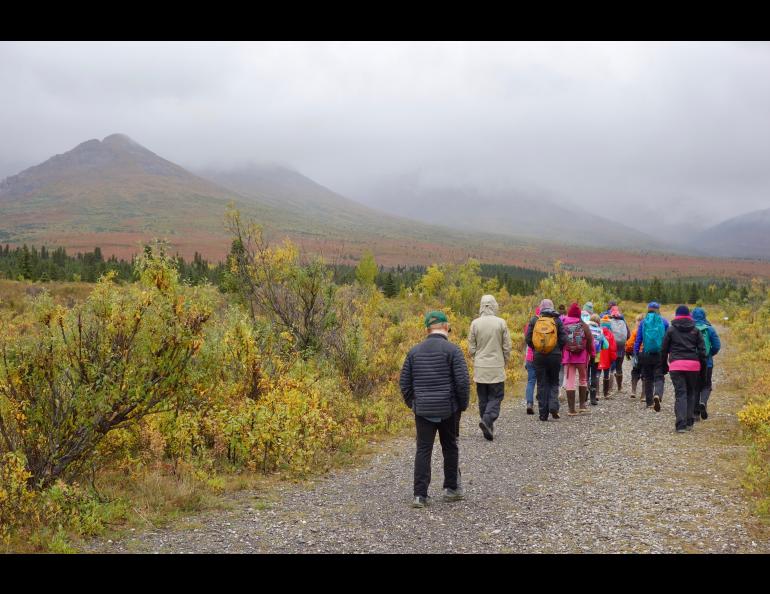
A northern sense of place
DENALI NATIONAL PARK — When I was 12 years old, I didn’t know permafrost was like frozen lasagna. I didn’t know what permafrost was. I grew up in a small town on the Hudson River in New York.
But here is my 12-year-old daughter and her classmates, gathered amid fragrant tundra plants. She is sitting on the T-end of a pointed steel rod, in order to help shove it in the ground. She stops when she feels a gentle thud a few feet down.
The frozen ground she reached has survived the heat of the summer, probably many summers. She has hit permafrost, a physical reminder of a time long ago during which frigid air pulled heat from the ground, leaving it hard as a rock deep beneath the surface.
Here at the Denali Science School, a three-day program put on by National Park Service rangers and Alaska Geographic instructors, these Fairbanks sixth-graders are learning more about the oversized peninsula on which they live.
They probably don’t know how unique Alaska is when compared to the rest of America. Most of them were born here. In less than a decade, when they are free, some of them will flee this land of cold, dark and spotty cell coverage. After a few years, one or two of them will come back.
For now, these sixth-graders might not know they are at the entrance to a northern Serengeti of caribou, bears, moose and dwarf birch, open country so different from their boreal forest home just 150 miles away.
Here, their teacher and a few parent chaperones have taken a few dozen kids down via the Alaska Railroad for 72 hours of togetherness. That time together includes two nights of sleeping on a classroom floor, and well thought-out science lessons both in the classroom and outside, in air pungent with the musk of high-bush cranberry.
Permafrost hiding beneath the soil is a tough subject for classroom engagement. But the Denali ranger showed a slice of frozen lasagna to represent a solid mass that is subject to change when heat is applied. It was a good comparison. Both are a mess when they thaw.
Combined with their actions of injecting of a steel rod into the muskeg and then lowering a thermometer into the resulting hole, the kids have a notion of the substance that exists beneath many of their homes, and the roads upon which their parents drive.
From an Alaska Geographic instructor, they heard that 11 packs of wolves totaling 75 animals live in the Denali National Park and Preserve, which is the size of New Hampshire. Unlike sixth-graders in New Hampshire, in which government officials paid the last bounty for wolf hides in 1895, these Alaska kids sleep in a clump of artificial lights surrounded by dark country in which wolves still cast shadows on river ice.
Using radio receivers with an H-shaped antenna mounted on a stick, the kids followed beeps to find collars a park ranger stashed in the woods. The battery/transmitter block of the collar was attached to a leather band that fit the neck of a wolf.
Maybe that exercise helped them appreciate the efforts of biologists and helicopter pilots who find the animals, hover above them, dart them, land, and tighten collars around their necks in order to find them later. Maybe some of these kids thought to themselves that being a biologist or helicopter pilot would be a cool job, and the search for the collar was a moment they will talk about later.
Maybe not. One shouldn’t expect someone to appreciate the only thing he or she knows, in this case living in a state with more caribou than people. I sure don’t remember having a sense of place when I was 12. I had no idea the river that smelled of sulfur just below the capacitor factory flowed 200 miles downhill to mix with the ocean at New York City.
But if these pre-teens go on to wear a suit every day in Brooklyn, they will have slept on snow, giggled at moose nuggets and stared at grizzly tracks in the mud. If they come away with nothing else, these Alaska kids will know where they came from.
A class of sixth-graders from Fairbanks attended the Denali Science School, a three-day program in Denali National Park and Preserve. Ned Rozell photo.






